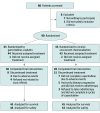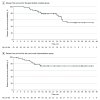Adjuvant Gemcitabine Plus Cisplatin and Chemoradiation in Patients With Gallbladder Cancer: A Randomized Clinical Trial
- PMID: 38958997
- PMCID: PMC11223048
- DOI: 10.1001/jamaoncol.2024.1944
Adjuvant Gemcitabine Plus Cisplatin and Chemoradiation in Patients With Gallbladder Cancer: A Randomized Clinical Trial
Abstract
Importance: There is limited evidence with regard to the benefit of adjuvant chemotherapy chemoradiotherapy in resected gallbladder cancers (GBCs).
Objective: To establish a baseline survival rate for operated GBCs in patients receiving either gemcitabine plus cisplatin (GC) or capecitabine and capecitabine concurrent with chemoradiation (CCRT).
Design, setting, and participants: The GECCOR-GB study was a multicenter, open-label, randomized phase 2 noncomparator "pick the winner" design trial of adjuvant GC and CCRT in patients with resected histologically confirmed adenocarcinoma or adenosquamous carcinoma of the gallbladder, (stage II/III) with no local residual tumor (R0) or microscopic residual tumor (R1). The study was carried out in 3 tertiary cancer institutions in India. Patients 18 years or older with adequate end-organ functions, and Eastern Cooperative Oncology Group Performance Status of 1 or lower between May 2019 and February 2022 were enrolled. The cutoff date for data analysis was February 28, 2023.
Interventions: Patients were randomized 1:1 to receive either GC every 3 weeks (maximum of 6 cycles) or CCRT comprising capecitabine with concurrent chemoradiation (capecitabine concurrent with radiotherapy) sandwiched between capecitabine chemotherapy.
Main outcomes and measures: The primary outcome was disease-free survival (DFS) at 1 year in randomized patients. This study was conducted as 2 parallel, single-stage phase 2 clinical trials. Within each treatment arm, a 1-year DFS rate of less than 59% was considered as insufficient activity, whereas a 1-year DFS rate of 77% or higher would be considered as sufficient activity.
Results: With a median follow-up of 23 months, 90 patients were randomized, 45 in each arm. Overall, there were 31 women (69%) and 14 men (31%) in the GC arm with a mean (range) age of 56 (33-72) years and 34 women (76%) and 11 men (24%) in the CCRT group with a mean (range) age of 55 (26-69) years. In the GC and CCRT arms, 1-year DFS and estimated 2-year DFS was 88.9% (95% CI, 79.5-98.3) and 74.8% (95% CI, 60.4-89.2), and 77.8% (95% CI, 65.4-90.2) and 74.8% (95% CI, 59.9-86.3), respectively. Completion rates for planned treatment was 82% in the GC arm and 62% in the CCRT arm.
Conclusions and relevance: In this randomized clinical trial, GC and CCRT crossed the prespecified trial end points of 1-year DFS in patients with resected stage II/III GBCs. The results set a baseline for a larger phase 3 trial evaluating both regimens in operated GBCs.
Trial registration: ClinicalTrials.gov Identifier: CTRI/2019/05/019323I.
Conflict of interest statement
Figures
References
-
- Ben-Josef E, Guthrie KA, El-Khoueiry AB, et al. SWOG S0809: a phase II intergroup trial of adjuvant capecitabine and gemcitabine followed by radiotherapy and concurrent capecitabine in extrahepatic cholangiocarcinoma and gallbladder carcinoma. J Clin Oncol. 2015;33(24):2617-2622. doi: 10.1200/JCO.2014.60.2219 - DOI - PMC - PubMed
Publication types
MeSH terms
Substances
LinkOut - more resources
Full Text Sources
Medical
Miscellaneous



